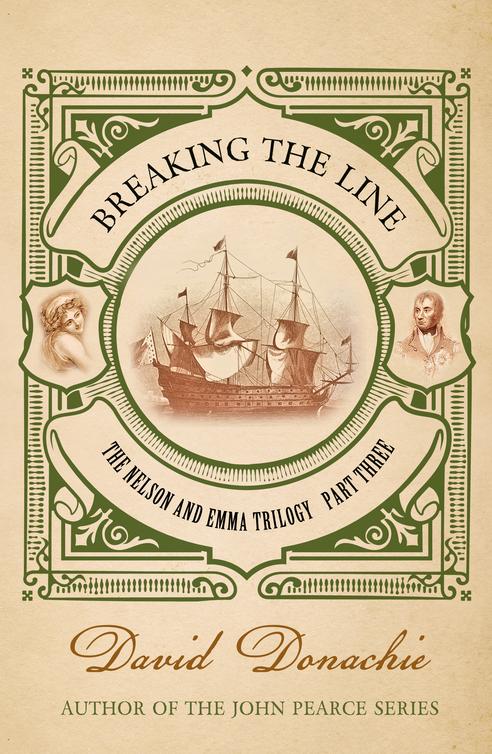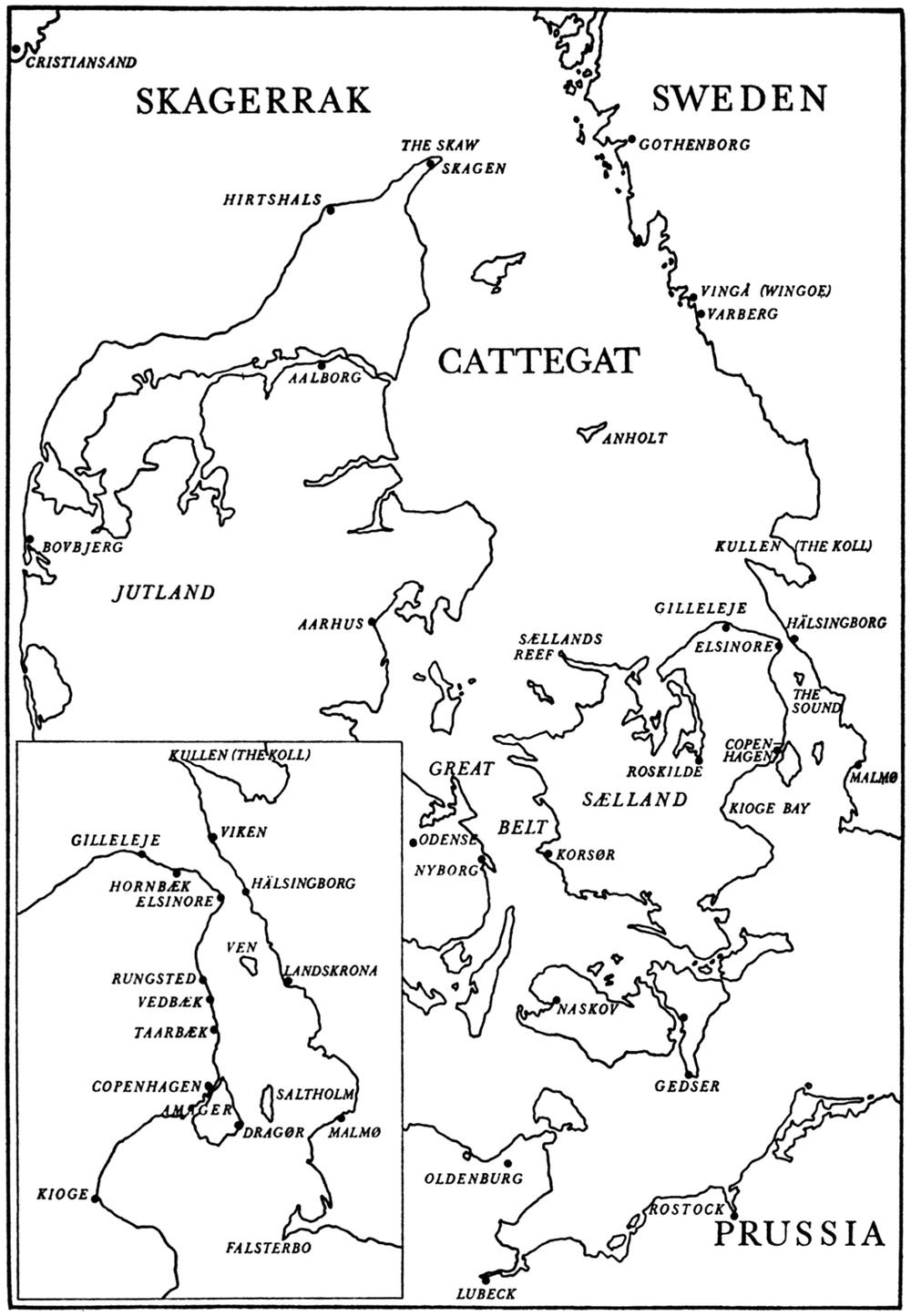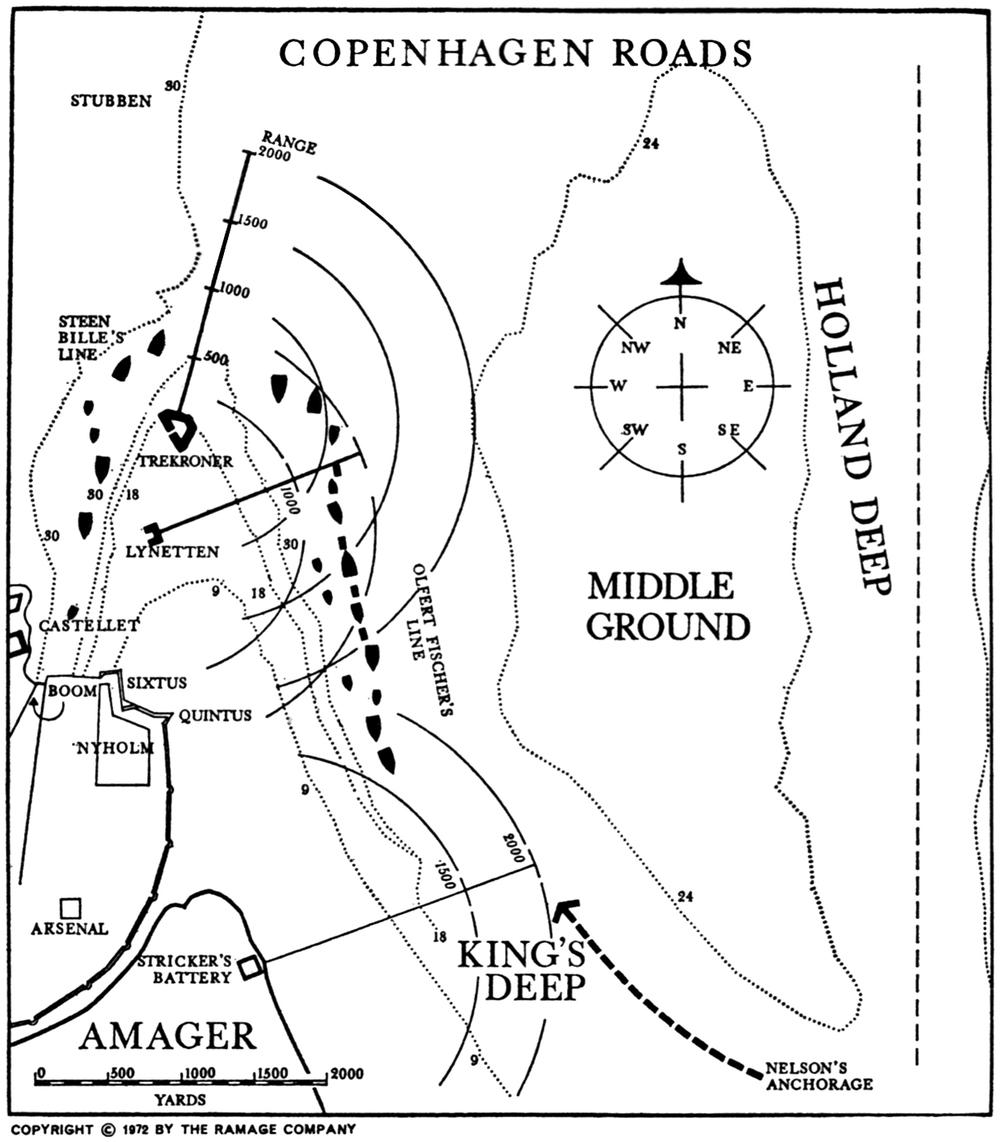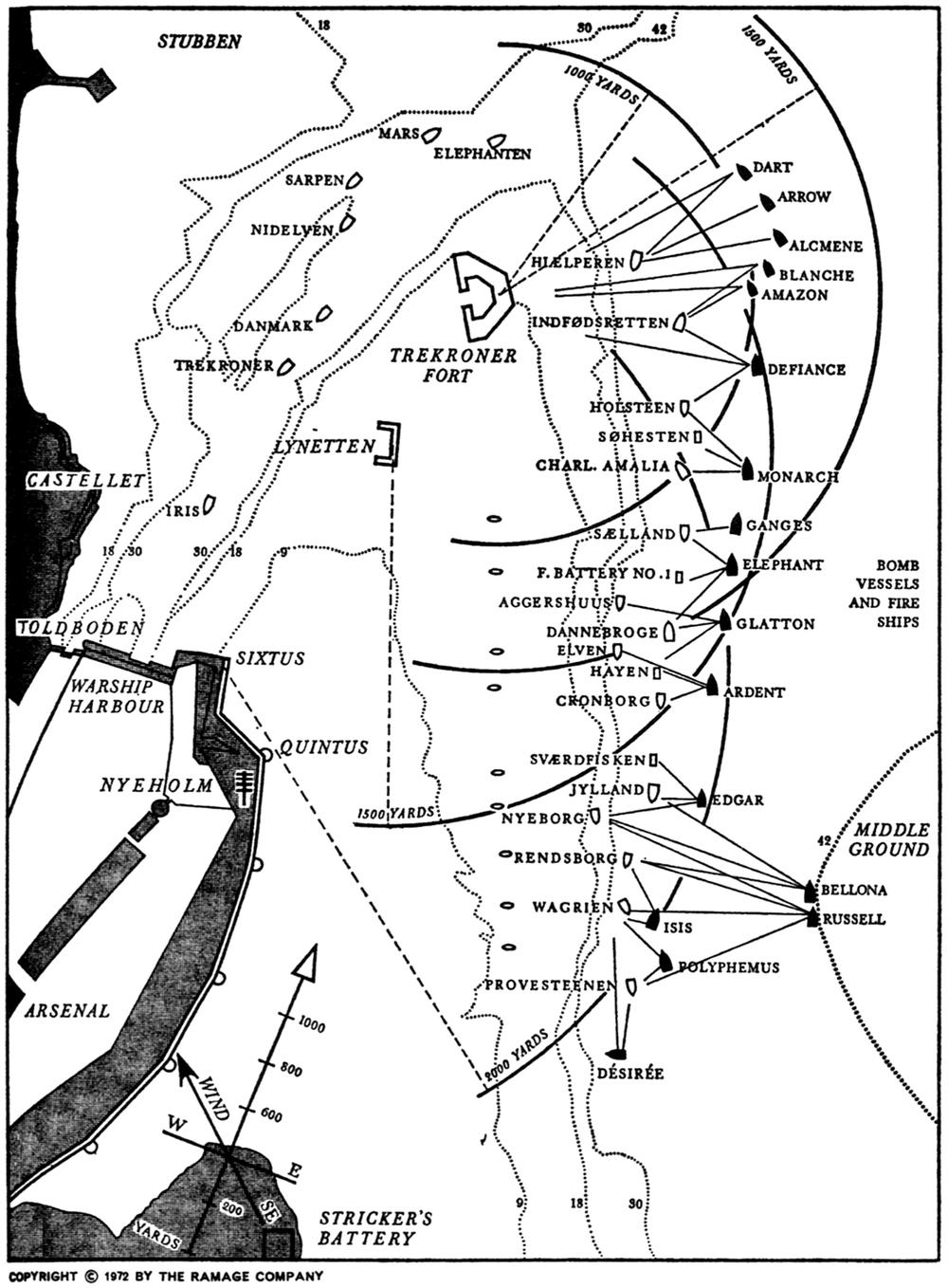Breaking the Line
Authors: David Donachie


As they rowed out to the Spithead anchorage she stood out, high-sided and majestic, even among the rest of the three-deckers. Nelson had seen her many times since that first day in Chatham when, as a new midshipman, Lieutenant Frears had pointed her out. Expertly his barge crew took him alongside to the ladder that led up to the entry port. A hand was ready to ensure that he did not slip on the wet wood that was dipping in and out of the water, and that he had hold of the rope banister that would see him safe aboard.
Nelson stepped from grey daylight to near darkness, to the sound of crashing marine feet and high-pitched whistles, and Hardy said to him,
‘Welcome aboard HMS
Victory
, sir.’

DAVID DONACHIE
To my beautiful daughter Charlotte
who has never once let me win an argument
| Aft: | | The rear of the ship. |
| Afterguard: | | Sailors who worked on the quarterdeck and poop. |
| Bilge: | | Foul-smelling water collecting in the bottom of the ship. |
| Binnacle: | | Glass cabinet holding ship’s compass: visible from the wheel. |
| Bowsprit: | | Heavy spar projecting from the front of the ship. |
| Broadside: | | The firing of all the ship’s cannon in one salvo. |
| Bulkhead: | | Moveable wooden partitions i.e. walls of captain’s cabin. |
| Cathead: | | Heavy joist that keeps anchor clear of ship’s side. |
| Capstan: | | Central lifting tackle for all heavy tasks on the ship. |
| Chase: | | Enemy ship being pursued. |
| Crank: | | A vessel that won’t answer properly to the helm. |
| Forecastle: | | Short raised deck at ship’s bows. (Fo’c’s’le) |
| Fish: | | To secure and lash the raised anchor to the ship. |
| Frigate: | | Small fast warship; the ‘eyes of the fleet’. |
| Larboard: | | Old term for ‘port’: left looking towards the bows. |
| Leeward: | | The direction in which the wind is blowing. |
| Letter of Marque: | | Private-armed ship licensed to attack enemy. (Privateer) |
| Log: | | Ship’s diary, detailing course, speed, punishments etc. |
| Logline: | | Knotted rope affixed to heavy wood to show ship’s speed. |
| Mast: | | Solid vertical poles holding yards.*(see below). |
| Mizzen: | | Rear mast. |
| Muster: | | List of ship’s personnel. |
| Ordinary: | | Ship laid up in reserve. |
| Orlop: | | Lowest deck on the ship, often below waterline. |
| Quarterdeck: | | Above maindeck, from which command was exercised. |
| Rate: | | Class of ship 1–6 depending on number of guns. |
| Rating: | | Seaman’s level of skill. |
| Reef: | | To reduce the area of a sail by bundling and tying. |
| Scurvy: | | Disease caused by lack of vitamins, especially C. |
| Scuppers: | | Openings in ship’s side to allow escape of excess water. |
| Sheet: | | Ropes used to control sails. |
| Sheet-home: | | To tie off said ropes. |
| Ship of the Line: | | A capital ship large enough to withstand in line combat |
| Sloop: | | Small warship-not rated. A Lieutenant’s command. |
| Spar: | | Length of timber used to spread sails. |
| Starboard: | | Right side of ship facing bows. |
| Tack: | | To turn the head of the ship into the wind. |
| Topman: | | Sailor who worked high in the rigging. |
| Wardroom: | | Home to ship’s officers, commissioned and warrant. |
| Watch: | | A division of the ship’s crew x 2. A portion of the day. |
| Wear: | | To turn the head of the ship away from the wind. |
| Windward: | | The side of the ship facing the wind. |
| Yard: | | Horizontal pole holding sail. Loosely attached to mast. |
| Yardarm: | | Outer end of yard. |

The approach from the North Sea to Copenhagen and the Baltic showing (inset) the direct route past Elsinore, and the alternative, through the Great Belt.

Copenhagen’s Roads, showing the positions of the Danish ships and Nelson’s course (broken line) southward down the Holland Deep to the night anchorage south of the Middle Ground. Depths are shown in feet and ranges are in yards. The precise positions of the shoals will never be known for certain. The standard drawing of the Battle (by Bundesen in 1901) was based on a chart of 1840, but documentary evidence and a chart from a survey made a few months after the Battle (and not seen by Bundesen) shows it to be wrong in certain respects. The above chart, by naval historian Dudley Pope, relies mostly on cross-checking. Although drawn independently and before the existence of the 1801 chart was known, it subsequently proved to be nearer the 1801 chart in showing the position of shoals than the previous charts – by Andreas Lous in 1763 and 1775 – which were probably in use at the time of the Battle. The experience gained in the Battle and in replacing the buoys probably led to the new survey in 1801.

This chart by Dudley Pope is based entirely on the reports of Danish and British officers and the logs of their ships, which agreed with each other to a remarkable degree. They allowed the position of
Russell
and
Bellona,
for example, to be established with some precision, and this in turn located the edge of the Middle Ground shoal. Depths are in feet and ranges in yards.
Alarm was not an emotion often expressed in the Admiralty building, sat squarely at the top of Whitehall. The working centre of Britain’s global maritime reach, everyone who occupied it, from doormen and servants to clerks, secretaries, civilian officials and admirals, prided themselves on their ability to take bad news with the same air of equanimity with which they received the good. All worked hard to comport themselves in wartime with no more application than they did during the short periods when Britannia was at peace.
Such an attitude was seen as a measure of their professionalism. That this did not extend to the First Lord of the Admiralty, who was a civilian and a political appointee – and thus a temporary controller of the nation’s maritime power – was hardly surprising. To his oft repeated interrogation, ‘Damn it, where is Nelson?’ the more experienced could only advise patience.
Lord Spencer, the present incumbent of the office, openly admitted that his responsibilities often interfered with his sleep. That he should be so affected was met by his more experienced colleagues with a mixture of sympathy and understanding, tinged with mirth. Yet even the most sanguine had to admit that the circumstances of the moment were exceptionally grave. The Royal Navy might control the seas on which they sailed, but on land the enemy, France, was everywhere victorious.
Austria, greatest of the nations to partake of the First Coalition against the French Revolution, had put five armies into the field in as many years and had seen them crushed. All of Northern Italy down to Rome was in enemy hands, a series of gimcrack republics set up on the Parisian model by the fearsome General Bonaparte.
The present French regime was less extreme than its predecessor,
which had lopped off the heads of King Louis and Queen Marie Antoinette. Known as the Directory, the current five-man government contained some of those regicides in its ranks. These men, naturally suspicious and tainted by greed, had created a policy that substituted theft abroad for terror at home and shipped Bonaparte and his army into the Mediterranean in search of further conquest.
Here was a golden chance for Britain to take on this menace, for the sea suited her more than it suited France. Catch that fleet and transports at sea and they might sink the ambitions of the Corsican, as well as those of his political masters. Lord Spencer, against opposition, had agreed to send Sir Horatio Nelson, the Navy’s most aggressive junior admiral, after Bonaparte.
Nelson was undoubtedly a fighter, and a few admirals who had commanded him saw the genius admired by the public – none more than John Jervis, Earl St Vincent, stationed off the main Spanish naval base of Cadiz, who had recommended his appointment. Others, though, including many of a more elevated rank, observed in Nelson only an insubordinate risk-taker, a man who had enjoyed a degree of success, but who was bound to overreach himself. Now, having sailed into the Mediterranean nearly two months before, the man seemed to have disappeared off the face of the earth.
‘Damn it, where is Nelson?’ echoed in the corridors of power, the coffee houses, and the salons of the powerful, repeated by serving officers, ministers and courtiers all the way up to King George himself. The sovereign was known to dislike the admiral and disapprove of his appointment.
The Prime Minister, William Pitt, wanted peace, but knew that would only come once France had been humbled. Nelson had been sent to stop Bonaparte, and clearly he had failed. He might have suffered a catastrophic defeat, losing ships and men that the Navy could not do without. Rumours abounded of a great battle fought in Egyptian waters, of a fleet destroyed, Nelson dead, most of his captains prisoners of the French, and Bonaparte triumphant again.
Those admirals senior to Nelson who felt the task should have been entrusted to them had ceased merely to question the wisdom of the decision. The looks cast at Lord Spencer now were not of pique from those who felt they had been overlooked, but said T told you so’. They knew what the First Lord did not: that Horatio Nelson might be as brave as a lion, but he was also an upstart and a chancer.
The weather did nothing to help: it was a cold November of high winds and slanting rain that rattled windows, and on nights when clouds raced across the moon, the First Lord would stand by his
bedroom window, repeating, to the annoyance and pity of his wife, ‘Damn it, where is Nelson?’
Fanny Nelson quelled her anxiety about her husband in strict adherence to her daily routine. She dealt with her correspondence, supervised her household, made calls on her friends and received them in return, all interspersed with sessions of embroidery. She tried not to think of what would happen to her husband should he prove too impetuous.
Certainly, his life was at risk, which Nelson’s father, the Reverend Edmund Nelson, never ceased to mention on his frequent visits. He reminded Fanny that his son had been mischievous as a boy, that his behaviour at school had resulted in several letters from his headmaster. Midshipman Horatio Nelson had been troublesome too, a fact which the Reverend Nelson had discovered from the boy’s uncle and first captain.
In the Mediterranean, Nelson’s history of endless single-ship actions, cutting out expeditions, sudden landings and hard won sieges, was seen by his tall, beetle-browed father as stemming not from zeal but impatience. That he had taken two ships in one attack at the battle of Cape St Vincent, a feat never before achieved by any naval officer, the Reverend saw bleakly as foolhardy rather than brave.
Yet Fanny was cheered by letters from men high and low singing her husband’s praises, naming him a hero fit to stand in the same pantheon as Francis Drake. Some were indecipherable scrawls from those barely able to read and write; others beautifully crafted epistles from professional scribes employed by the wholly illiterate. The ones that pleased her most came from people of some station – noblemen, city merchants, land owners, ambassadors and their wives at foreign courts, all those who wanted to record their gratitude to Rear Admiral Sir Horatio Nelson KB for their peace and security.
She had also a stack of letters from men with whom her husband had served; soldiers, sailors, political envoys and even exiled Britons, either temporary travellers or those domiciled abroad. Many were kind enough to mention her son Josiah too, and to note that, as a young naval officer, he was on the way to making both his mother and his stepfather proud.
Then she had Nelson’s own letters, full of affectionate sentiment as well as advice on everything from her dealings with his family to how she should disburse their new found security. It grated on her somewhat that her husband felt able to recommend to her a house when he was a thousand miles from the location and she just a few.
But he had always been prepared to expound on any matter that he felt
came within his province.
There were other letters that Fanny read out of a sense of duty, scurrilous anonymous drafts that sought to inform her, more in sorrow than in anger, that if her husband was a true British hero, he was no saint. If they were to be believed, there was no venality to which Horatio Nelson would not stoop: corrupt misuse of government monies, grovelling to foreign potentates, and a concubine in every port. These she dismissed as the natural products of jealous natures. Her husband had achieved so much that envy was inevitable. He spent Admiralty money on his sailors’ comfort. He flattered kings and queens in the interests of his country. As for the last accusation, Horatio had needs, all men did, but they were those of a mature husband and stepfather: he was not a callow young rake.
But sometimes, as she looked at her reflection, she was aware that the looks he had once admired had faded. Gone was the glow of a skin once warmed by Caribbean sun, and in its place a pallor brought on by northern weather and age, with lines now that no amount of powder could disguise, around the eyes, the mouth and even her lips.
In such moments, when she contemplated the difficulties of a naval wife, it took a stern mind to allay her fears. She was a good and dutiful spouse, an accomplished social hostess; she treated supplicants at her door, especially wounded ex-sailors, with the proper measure of kindness, even sat listening to the ramblings of Captain William Locker, one of Nelson’s former commanders whom her husband called his ‘sea daddy’. Fanny wrote continually to her husband to report her actions, meetings and tender feelings, and was reassured by his replies – naturally infrequent from a man on active service – which never failed to remind her that she was the companion of his heart.
She prayed that he was safe and well, that he would be successful in his duties, and that he would come home one day to rest on his well-earned laurels in a scene of harmonious domestic tranquillity which she would create for him.

